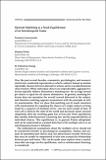Operant Matching as a Nash Equilibrium of an Intertemporal Game
Author(s)
Loewenstein, Yonatan; Prelec, Drazen; Seung, H. Sebastian
DownloadSeung_Operant Matching.pdf (140.2Kb)
PUBLISHER_POLICY
Publisher Policy
Article is made available in accordance with the publisher's policy and may be subject to US copyright law. Please refer to the publisher's site for terms of use.
Terms of use
Metadata
Show full item recordAbstract
Over the past several decades, economists, psychologists, and neuroscientists have conducted experiments in which a subject, human or animal, repeatedly chooses between alternative actions and is rewarded based on choice history. While individual choices are unpredictable, aggregate behavior typically follows Herrnstein's matching law: the average reward per choice is equal for all chosen alternatives. In general, matching behavior does not maximize the overall reward delivered to the subject, and therefore matching appears inconsistent with the principle of utility maximization. Here we show that matching can be made consistent with maximization by regarding the choices of a single subject as being made by a sequence of multiple selves—one for each instant of time. If each self is blind to the state of the world and discounts future rewards completely, then the resulting game has at least one Nash equilibrium that satisfies both Herrnstein's matching law and the unpredictability of individual choices. This equilibrium is, in general, Pareto suboptimal, and can be understood as a mutual defection of the multiple selves in an intertemporal prisoner's dilemma.
Date issued
2009-09Department
Massachusetts Institute of Technology. Department of Brain and Cognitive Sciences; Sloan School of ManagementJournal
Neural Computation
Publisher
MIT Press
Citation
Loewenstein, Yonatan, Drazen Prelec, and H. Sebastian Seung. “Operant Matching as a Nash Equilibrium of an Intertemporal Game.” Neural Computation 21.10 (2009): 2755-2773.
© 2011 The MIT Press
Version: Final published version
ISSN
0899-7667
1530-888X